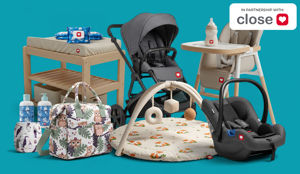Watching your baby achieve new milestones is an exhilarating part of parenting. One of the first major developmental milestones is when your baby begins to lift and hold their head up. Understanding when this happens, how to help them along, and what to expect next can make this journey smoother for both you and your little one. Here’s a guide to everything you need to know about your baby lifting their head.
When Can Babies Hold Their Head Up?
Babies typically begin to show signs of head control from as early as one month old. By the end of the second month, many babies can briefly lift and turn their heads while on their tummies.
This is an exciting step, but don’t expect your little one to hold their head for extended periods right away. Significant control, where they can hold their head up without much support, generally develops between three to five months of age. Remember that each baby is unique, so as always there is a range of normal development times.
How to Help Your Baby Develop Head Control
Tummy time is crucial for helping babies develop the muscles needed for head control. The NHS recommends starting tummy time as early as the first day home from the hospital, as long as they are wide awake.
Aim for several short sessions each day, gradually increasing to a total of 20 to 30 minutes by the time your baby is three to four months old. Place your baby on their tummy on a soft, flat surface and encourage them with toys or by lying down in front of them.
Interactive activities can also support your baby’s muscle development. Using tummy time toys or making funny faces and sounds to encourage your baby to lift their head can be very effective.
Holding your baby on your chest while you’re reclined is another great way to help them practice lifting their head while still feeling secure.
Read More: Your Ultimate Guide to Tummy Time
How to Support Baby’s Head Before They’re Able to Lift It Up
Before your baby can hold their head up independently, it’s key to support their head and neck during all activities. Cradle their head when picking them up, holding them, or changing their nappy. However, allow their head some freedom to move naturally to encourage muscle development.
As your baby grows stronger, you can gradually reduce the level of support you provide. By around four to six months, many babies have enough control to hold their head up without support, but make sure to always ensure they are comfortable and safe before lessening your support completely.
What Milestones Come Next?
Once your baby has developed good head control, they are ready to move on to other exciting milestones. These typically include rolling over from their tummy to their back and vice versa, which usually happens around four to five months. After mastering rolling, your baby will start to sit up with support, and eventually without it, leading to crawling and even standing.
The ability to roll over usually appears between four to six months. Sitting up often follows, with many babies starting to sit with some support around four to six months and sitting independently by eight to nine months. These developments are critical as they allow your baby to explore their environment more actively.
Read More: When Will My Baby Roll Over?
When to Reach Out to Your Doctor
While every baby develops at their own pace, there are certain signs you should watch for that might indicate a need to consult your doctor. If your baby isn’t showing any head control by three to four months, doesn’t seem to enjoy tummy time at all, or if you have any concerns about their development, it’s a good idea to speak to your Health Visitor or GP. They can offer guidance and check for any underlying issues.
Helping your baby develop head control is a significant step in their physical development. Through regular tummy time, engaging activities, and proper support, you can encourage your little one to reach this exciting milestone.






